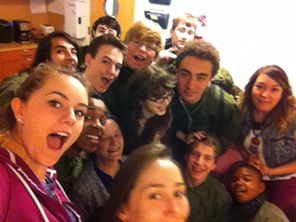I emerge from my blogging absence with lots of stories to tell and thoughts to organize. As it turns out, a full-time-and-then-some internship and a second job makes one quite busy! I was not idle in my hiatus, however. I was simply too busy DOING to record anything. I would like to find a better balance between work and writing, and I would like to keep my skills honed and my online presence…existent. So upon the conclusion of my internship, here is my first post about the most important thing I learned from the experience working on the Signature in the School’s production of the new play “Hero Worship” by Joe Calarco: what I’m doing with my life and why it matters.
Nervous energy courses through the air as a group of young soldiers mills around the small space. Some listen to music to get in the zone. Others chatter about school. Some simply concentrate on the task at hand. What they are about to do will take courage, focus, and teamwork. If they succeed, they might just change the world.
This isn’t June 6, 1944. This is March 10, 2014, and although this group of teenagers isn’t facing Nazi troops and bullets, they have some things in common with the D-Day soldiers they are portraying. They’re young (many soldiers at Normandy lied about their age and were actually 16 or 17). They’ve trained together for weeks (including an 3-week dramaturgy/acting rehearsal intensive called “boot camp”). They believe in their cause (these kids gave up 3 hours of time every day AFTER long days at school to rehearse.) And they’re a little nervous, because what they’re going to do is hard: they’re about to perform a play with very mature/controversial themes in front of 250 of their peers.
These high school actors blew me away.
They not only handled serious content (like war, race, PTSD, and suicide) with maturity and sensitivity, they showed some real talent on Signature’s professional stage. But as an educator, what most impressed me wasn’t their innate talent – although there was plenty of that – but rather their openness to instruction and support of each other. At one point, I had to make one of the actresses recite a monologue in which her character is reading her father’s suicide note again and again. I had to push the actress to completely break down and find her character’s vulnerability. She did it without question. At another point, I was responsible for directing 6 teenage boys by myself through a complicated D-Day sequence. They were completely attentive and respectful while I gave notes. On another day, when we did an exercise in which the whole cast was to go around a circle and say one positive sentence about each other person, everyone ended up saying a paragraph.
Perhaps the most validating moment for me as a dramaturg came during the talkbacks in the public performances. I had spent 2 months putting together what turned out to be a GIANT history resource guide for the cast and crew. I knew after the fact that I wrote too much, and there’s no way these kids would read it all. I was also convinced I had botched my dramaturgy teaching in the boot camp rehearsals. That was my first time teaching history to high schoolers, and the kids’ first impression of me. Many of them had already had one or two other interns from previous participation of Signature in the Schools. I was so nervous! Yet during the public talkbacks, when someone asked how they prepared for their roles, they immediately referenced the boot camp lessons and my resource guide. I almost exploded with pride.
These actors and crew members are young adults, not children, but they DO listen. They are about to become old enough to vote and enlist. They are solidifying values and opinions. And they make me very hopeful for the next generation of theatre practitioners and American citizens. Because of Signature in the Schools, they will be aware of the issues of war and returning veterans for the rest of their lives. They know the significance of D-Day and the Greatest Generation.

Students had the privilege to work with DC professional actress Nancy Robinette
That’s the power of dramaturgy, teaching, and high school theatre programs. Theatre education programs are not just a way to keep the theatre at non-profit status. They might be the most important outlet to change society that a theatre has, if done right. Regional theatres and public school districts should not underestimate these kids. They will rise to the standards their educators set, so aim high.
After doing this internship, I believe that more greatest generations are yet before us. That’s why I do what I do.





